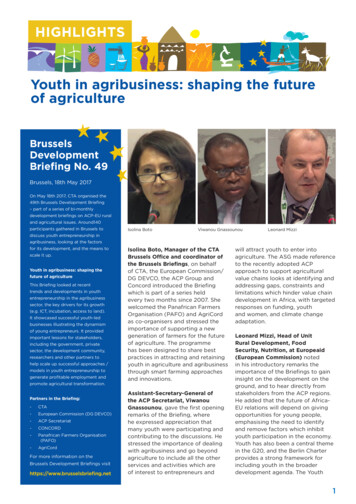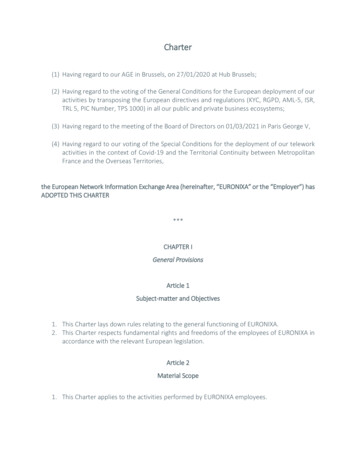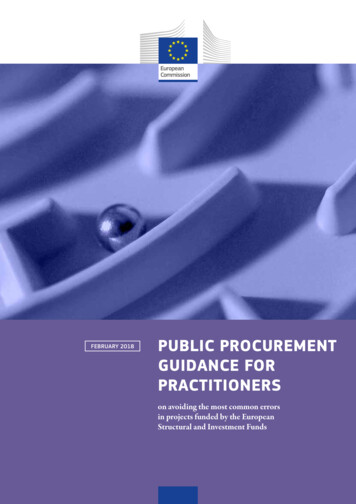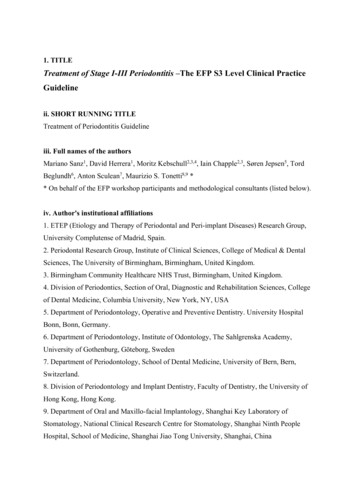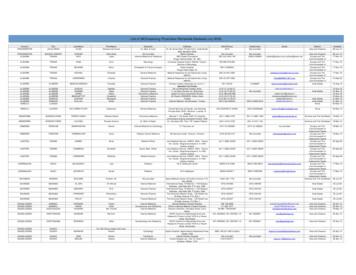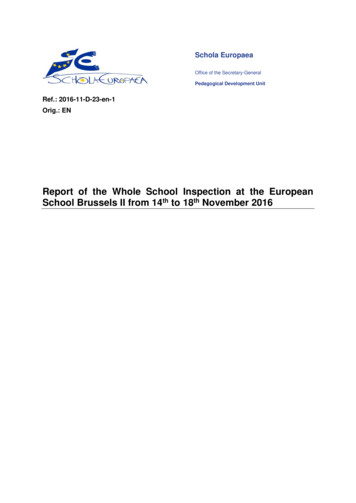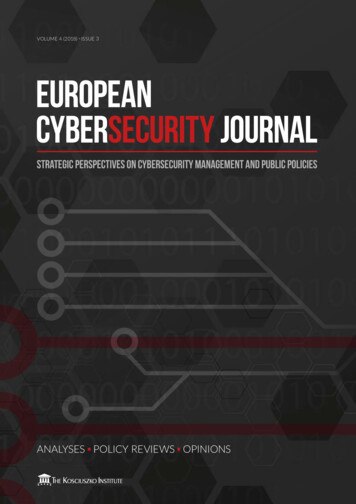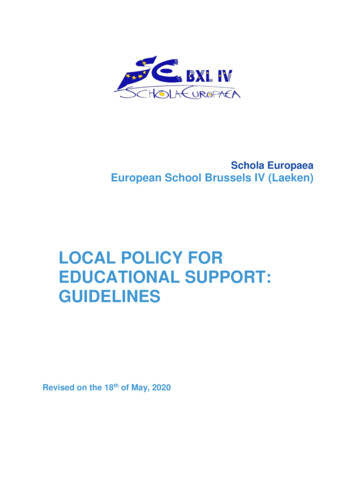
Transcription
Schola EuropaeaEuropean School Brussels IV (Laeken)LOCAL POLICY FOREDUCATIONAL SUPPORT:GUIDELINESRevised on the 18th of May, 2020
Table of contents1.Legal framework . 32.Differentiation . 43.EEB4 values and educational support . 44.Respect for confidentiality . 45.Early identification of Special Educational Needs . 56.Cycle transtion . 57.Types of Educational Support. 68.Requesting Educational Support . 78.1.Procedure for General Support . 78.2.Procedure for Moderate Support. 88.3.Procedure for Intensive A support . 88.4.Procedure for Intensive B support . 99.Actions for high-potential or gifted pupils . 910.Special arrangements . 1010.1.Special arrangements for S1 to S5. 1010.2.Special arrangements for S6 & S7 (Baccalaureate cycle) . 1011.Support Advisory Group . 1112.Tripartite agreements . 1213.Reorientation – Transition to other schools . 1214.Pupils’ absences . 1215.Pupils’ evaluation . 1316.Learning Environment in EEB4 . 1317.Educational Support and continuous professional development . 1418.Appeals . 1419.The Support Teams. 1520.Appendices . 1620.1.Composition of the Support Advisory Group . 1620.2.Model template of Intensive Support Agreement . 1720.3.Model template for Individual Learning Plan for Moderate Support . 1920.4.Model template for Individual Learning Plan for Intensive Support. 21Page 2 of 24European School of Brussels IV86, Drève Sainte-Anne – 1020 Bruxelles (Laeken)Tel.: 02/340.13.91 - Fax: 02/340.14.98 – www.eeb4.be
1. Legal frameworkThe Educational Support guidelines of the European School Brussels IV respects the legalframework determined by the decision making bodies of the European Schools:FRAMEWORK DOCUMENTSGeneral Rules of the European Texts/2014-03D-14-en-8.pdfPolicy on the Provision of EducationalSupport in the European ents/2012-05D-14-en-9.pdfProvision of Educational Support in theEuropean School – Procedural uments/2012-05D-15-en-12.pdfReport on “inclusive education in theEuropean cuments/2018-09D-28-en-4.pdfEvaluation Report on the Implementation ofthe Educational Support Policy in theEuropean ents/2018-09D-53-en-4.pdfGuidelines for Decisions on Discontinuationof Studies of Pupils with SpecialEducational Needs2019-06-D-14-en-4Guidelines for Decisions on the Enrolmentof Pupils with Special Educational Needs2019-06-D-10-en-4Template for the request for Specialarrangements for the EuropeanBaccalaureate2014-09-D-12Tripartite agreementMemorandum – RE: Reminder of certainarrangements for the support servicesprovided by therapists for pupils with specialeducational needs2016-09-M-5-enPage 3 of 24European School of Brussels IV86, Drève Sainte-Anne – 1020 Bruxelles (Laeken)Tel.: 02/340.13.91 - Fax: 02/340.14.98 – www.eeb4.be
2. DifferentiationDifferentiation forms the basis of effective teaching in the European School system.Differentiated teaching is aimed at meeting the pupils’ individual needs by using a variety ofteaching approaches, methods and activities. This is the responsibility of every teacherworking in the European Schools and must be common classroom practice.EEB4 has a proactive policy to improve differentiation by encouraging the exchange of "goodpractice" between teachers through peer-to-peer training and shadowing. Trainings by externalexperts are also organised on this topic. Teachers foresee different strategies for differentiation(by content, by production, by process, by organisation, etc.) in their forward planning. Duringstatutory inspections, teachers are assessed on their ability to differentiate.Where normal differentiation in the classroom is not sufficient, the European School systemhas established a range of support structures to help pupils with learning difficulties, learningdisabilities or other problems access the entire curriculum so that no child is left behind.3. EEB4 values and educational supportOur educational support guidelines and actions need to be consistent with our multi /04/2.4.1 -1-EN-Plan-pluriannuel-2018-2020.pdfIn this sense, assuring pupils’ wellbeing is one the foundations of our support structures. Wewill work on pupils’ motivation, self-esteem and in creating a safe and caring atmosphere forour pupils.Another important aspect is fostering pupils’ independence and autonomy. To that end, theuse of digital tools and resources will play an important role.The vision of the EEB4 implies a strong sense of community. Psychologists, advisors,teachers, assistants and the management are all working together to support our pupils. Weare also convinced that in order to learn well, pupils must feel included and considerthemselves as part of the social fabric of the school.Frank and open communication with parents and legal representatives is also a crucial aspect.We aim at a continuous improvement in the cooperation and partnership with parents bothindividually and through the APEEE. Different channels and frequent occasions for theexchange of information and ideas have been established for that.4. Respect for confidentialityEEB4 will spare no effort to put in place all the necessary measures to ensure theconfidentiality of information shared by the families, pupils or external specialists in compliancewith the General Data Protection Regulations (GDPR) See here: https://eeb4.be/dataprotection/The school reserves the lawful right to contact competent external institutions (CLB, PMS,Youth Protection Service, etc.) in the event that the confidential information provided raisedserious health, safety or security concerns regarding our pupils.Page 4 of 24European School of Brussels IV86, Drève Sainte-Anne – 1020 Bruxelles (Laeken)Tel.: 02/340.13.91 - Fax: 02/340.14.98 – www.eeb4.be
Pupils’ educational support files are safely stored. They are only accessible to the authorisedstaff members who commit to safeguard their confidentiality.5. Early identification of Special Educational NeedsThe special Educational Needs of a pupil should be identified at the earliest possible momentin a child’s schooling. The early identification of pupils’ needs and the early provision ofadequate remedial measures can lead to improved achievement.At EEB4, teachers use various resources for timely identification of pupils’ educational needs.It has to be noted that information gathered at enrolment is not always comprehensive enough.New pupils deserve a special attention.References: Provision of Educational Support in the European Schools - Procedural document - 2012-05-D-15en-12 (A6) Evaluation Report on the Implementation of the Educational Support Policy in the European Schools- 2018-09-D-53-en-4 (cf. 5.1.2; 7.1)6. Cycle transtionNursery to Primary Nursery teachers must notify the Educational Support Coordinator of any pupils whohave received support and/or continue to need support as they move to primary. Future P1 teachers should attend end-of-year SAG meetings organised for M2 pupilswho will continue to receive educational support in P1. The future P1 class/support teacher should attend the Class Council M2 in June.Primary to Secondary The primary coordinator shares all the information regarding pupils in the differentsupport areas with the secondary coordinator.The secondary coordination attends the P5 End of Year Advisory Groups and P5Class Councils. The secondary coordination meets with the primary schoolpsychologist.The Coordination of Primary Support arranges with assistants and Support teachersof P5 lesson observations and walks to the Secondary buildings to discover theSecondary environment for the most severe INT A cases.Observations of the most severe pupils INT A cases who will go to Secondary arecarried by the assistant SEC who will be probably in charge after the move toSecondary.The secondary coordinator passes on the information relating to P5 pupils to the s1s3 cycle coordinator, to the educational advisor of S1 and to the S1 class teachers.Reference: Provision of Educational Support in the European Schools. Procedural document - 201205-D-15-en-12 (cf. 3.1, 5.2)Page 5 of 24European School of Brussels IV86, Drève Sainte-Anne – 1020 Bruxelles (Laeken)Tel.: 02/340.13.91 - Fax: 02/340.14.98 – www.eeb4.be
7. Types of Educational SupportTypes ofsupportDurationStartConcerns6-8 weeksor moreFrom September or OctoberAt any moment of the yearAny pupil who faces academicdifficultiesPriority is given to the main subjects Subject boost in small groups Support delivered in or outside the classroom,during the normal daily timetable (inSecondary, during the free periods)1 yearunlimitedASAP if the pupil is alreadyknownAfter diagnosis (externalexpert report,recommended) and/orSAG-meetingPupils with moderate learningdifficultiesPupils experiencing difficulty accessingthe curriculum due to language issues,concentration problems or other reasons Subject lessons, methodological support,learning to learn clinics 1 on 1 or in small groups Special arrangements Support delivered in or outside the classroom,during the normal daily timetable (inSecondary, during the free periods)1 yearunlimitedFrom the first day if thepupil is already known(assistant).After diagnosis and/orSAG-meeting.Pupils with severe learning difficulties orlearning disabilitiesPupils with an illness or syndrome hinderslearning.Pupils who needs daily help andassistance to make school life easier(physically or emotionally handicapped). Targeted educational support to addresslearning, emotional, or behavioral needs Subject 1 on 1 or small group Special arrangements Possibly an assistant (part time or full time). Support delivered in or outside the classroom,during the normal daily timetable6 weeks orlongerdependingon thelearningneedsAfter approval of the Director New pupilsor his representatives.A pupil without particular specialeducational needs but missing parts ofthe European School curriculum due todifferent circumstances (change ofschool, long term absence, etc.)GeneralModerateIntensive AIntensive BSupport settings (courses & arrangements) Intensive language support courses to enablethe pupil to access the ES curriculum. 1 on 1 or small groups. Support delivered in or outside the classroom,during the normal daily timetable (inSecondary, during the free periods)Reference: Provision of Educational Support in the European School - Procedural document - 2012-05-D-15-en-12Page 6 of 24European School of Brussels IV86, Drève Sainte-Anne – 1020 Bruxelles (Laeken)Tel.: 02/340.13.91 - Fax: 02/340.14.98 – www.eeb4.be
8. Requesting Educational SupportParents, pupils, teachers can take initiative to request educational support. For some forms ofeducational support, reports from external experts are necessary.For new pupils, if reports are included in the enrolment file, EEB4 will take the initiative tocontact the parents.8.1. Procedure for General SupportRequest for General support (subject teachers, parents, classteachers, class councils)The support coordinator creates the support groupA Group Learning Plan (internal document) is produced by thesupport teacher in collaboration with the subject teacherThe subject teacher communicates the practical details of the courseto the parents and the pupil.Participation in General support courseReview during the class councilPage 7 of 24European School of Brussels IV86, Drève Sainte-Anne – 1020 Bruxelles (Laeken)Tel.: 02/340.13.91 - Fax: 02/340.14.98 – www.eeb4.be
8.2. Procedure for Moderate SupportRequest for Moderate supportSupport coordinator is informed and case discussed with parents, teachers Parents contacted aim: External reports (recommended)Parents submit report to Support coordinator & School psychologistSupport coordinator plans:Support course-sSpecial arrangements (up to S5) according to recommendations of the reportCommunication to teachers as agreedIndividual Learning PlanParticipation in Moderate Support1:1 course-s // TutorReview through the year with parents8.3. Procedure for Intensive A supportRequest for Intensive A supportSupport coordinator is informed and case discussedParents contacted Aim: external reports (mandatory)Parents submit report to Support coordinator & School psychologistSupport coordinator plans Support Advisory Group (SAG) meeting(parents, CT, ST, Support teacher, Support coordinators, internal/externalexperts, poss. Director GS)Agreement for Intensive A support is signedILP (1x/year) consultation with CT and results of SAGParticipation in INT A Support1:1 course-s // AssistantReview through SAG 1x/yearPage 8 of 24European School of Brussels IV86, Drève Sainte-Anne – 1020 Bruxelles (Laeken)Tel.: 02/340.13.91 - Fax: 02/340.14.98 – www.eeb4.be
8.4. Procedure for Intensive B supportRequest for Intensive B support (subject teachers, parents, class teachers,class councils)The support coordinator creates the support lesson/groupAn Individual Learning Plan is produced by the support teacher incollaboration with the subject teacherThe support teacher communicates the ILP and the practical details of thecourse to the parentsParticipation in Intensive B support - Group course or 1:1Evaluated ILP is communicated to the parents at the end of each semester9. Actions for high-potential or gifted pupilsCondition The pupil’s learning potentials are not challenged. The pupil feels frustrated at school, demotivated, and even at risk ofdropping out.Procedure Actions towards HP or gifted pupils can take place in various forms: Privileged tutoring with a volunteer teacher; Free audition of other courses (with the agreement of the teachersconcerned); Meetings with the support coordination to define and monitor needs; Academic enrichment courses (within budgetary constraints); Organization and methodology courses; Support to participate in projects (competitions, Olympiads etc) Allowed to take more periods than the maximum regulated.Subject to sufficient documentation and a positive advisory opinion from theAdvisory Group or the management, the Class Council may deliberate on thedesirability of early promotion, provided it does not prejudice the pupil’sdevelopment.References: Provision of Educational Support in the European School - Procedural document - 2012-05-D-15en-12 (cf. 1.2; A6) Policy on the Provision of Educational Support in the European Schools - 2012-05-D-14-en-9 (cf.1.2)At EEB4, every pupil receives the support that corresponds to his or her individual profile. Highpotential and gifted pupils should be given adequate challenges. The support of these pupilsis just as important as the support of pupils with other special needs.Page 9 of 24European School of Brussels IV86, Drève Sainte-Anne – 1020 Bruxelles (Laeken)Tel.: 02/340.13.91 - Fax: 02/340.14.98 – www.eeb4.be
10. Special arrangements10.1. Special arrangements for S1 to S5ConditionIf a pupil has a physical and/or learning disability, whether temporary orpermanent and provides a recent (2 years old maximum) comprehensivemulti-disciplinary report, he can require arrangements to access the standardcurriculum, a computer in the classroom, etc. and also special arrangementsin regards to the examination situations at any time, as needed.DecisionThe decision is taken by the school for all pupils and specifically by theAdvisory Group for Intensive A pupils.References: Provision of Educational Support in the European Schools - Procedural document - 2012-05-D-15en-12 (cf.1.3) Policy on the Provision of Educational Support in the European Schools - 2012-05-D-14-en-9 (cf.1.3)10.2. Special arrangements for S6 & S7 (Baccalaureate cycle)ConditionIf a pupil has a physical and/or learning disability, whether temporary orpermanent and provides a recent (2 years old maximum) comprehensivemulti-disciplinary report, he can require arrangements to access the standardcurriculum, a computer in the classroom, etc and also special arrangementsin regards to the examination situation. Procedure& Decision The request ( the report) must reach the school by October 15 of theyear S5.Newly arrived pupils have the opportunity to submit an application afterthis deadline.For certain special arrangements (cf. 3rd document below from I1 toI14): the decision is taken by the Secretary General of the EuropeanSchools, after approval by the school, on the basis of a supporting fileincluding a report by a specialist meeting the valid criteria.For other arrangements (cf 3rd document below from D1 to D6): thedecision is taken by the school on the basis of a supporting file includinga report by a specialist meeting the valid criteria.References: Provision of Educational Support in the European School - Procedural document - 2012-05-D-15en-12 (cf. 1.3) Policy on the Provision of Educational Support in the European Schools - 2012-05-D-14-en-9 (cf.1.3) Arrangements for Implementing the Regulations for the European Baccalaureate (Applicable for theYear 2020 European Baccalaureate session) - Annex VII Procedure for the requesting of special arrangements in the European Baccalaureate - 2015-05-D12-en-18EEB4 ensures that special arrangements recommended in the multi-disciplinary report areoptimally implemented. All teachers receive a list of the special arrangements prepared by thesupport coordinator at the beginning of the school year and a reminder before the Btests/exams.Page 10 of 24European School of Brussels IV86, Drève Sainte-Anne – 1020 Bruxelles (Laeken)Tel.: 02/340.13.91 - Fax: 02/340.14.98 – www.eeb4.be
11. Support Advisory GroupMembers The pupil’s parents. The Deputy Head or his delegate (support coordinator) who chairs themeeting. The support coordinator. The class teacher, L1, L2 and mathematics teachers. The school psychologists and the support assistants.MeetingThe SAG meets at least once a year: At the end of the school year in order to organise the transition to nextyear and to give an opinion to the class council on promotion or othermatters. At the start of the convention for new pupils in order to specify the specialarrangements in place for the support. At any time in order to take new elements into account.Procedure A Formal invitation is issued by the school.Minutes are drawn up by the support coordinator.During the Advisory group, the intensive support A convention is signed.On the basis of the medical, psychological, psycho-pedagogical or multidisciplinary report, the Support Advisory Group formulates measures tomeet the pupil’s special needs, to assess his or her situation andprogress.The minutes are made available upon request.Reference:Provision of Educational Support in the European Schools - Procedural document - 2012-05-D-15-en12 (Annex 1)At EEB4, in order to facilitate a smooth transition from P5 to S1, the Deputy Director of Nurseryand Primary and the Nursery/Primary Educational Support Coordinator, will organise SAGmeetings in cooperation with the Secondary Educational Support Coordinator and the schoolpsychologists, to facilitate the transfer of information relating to individual pupils’ strengths,challenges and learning plans. Similar arrangements are in place for transition from nursery toprimary.Page 11 of 24European School of Brussels IV86, Drève Sainte-Anne – 1020 Bruxelles (Laeken)Tel.: 02/340.13.91 - Fax: 02/340.14.98 – www.eeb4.be
12. Tripartite agreements Condition Procedure Intensive A or Moderate Support pupil - presenting a report justifying sucha need - can benefit from the follow-up of a specialist in the school andduring school hoursThese specialists - paramedical auxiliary staff, therapists (essentiallyspeech therapists and other therapists) - are chosen and paid for by theparents.Time slots are decided with the parents, in accordance with the pupil'sfree periods (e.g. one or two periods per week).An agreement must be signed between the school, the parents and thetherapist (included in the list of EE-approved therapists).The list of therapists is validated by the PMO (European Commission).Parents are invited to contact the educational support coordinator or theschool psychologist to request the approved list of therapists. Parents canrequest reimbursements for the therapist’s services under the JointSickness Insurance System (JSIS) of the European Institutions.Reference:Provision of Educational Support in the European Schools - Procedural document - 2012-05-D-15-en12 (3.1.4)At EEB4, the school psychologists can guide parents in the choice of specialists.13. Reorientation – Transition to other schoolsIt is important to be aware that the European Schools are mainstream educationestablishments. However, at EEB4 we aim at being as inclusive as possible within the limits ofour regulations and the available resources and expertise. Should we be not prepared to meetthe educational needs of a pupil at a given moment, we will open a frank dialogue with theparents and we will try to help them explore different possibilities of school reorientation.To this end, we will try to establish cooperation with local, regional or national communityservices.Reference:Policy on the Provision of Educational Support in the European Schools - 2012-05-D-14-en-9 (cf.1.5)14. Pupils’ absencesAttendance to educational support classes is mandatory. Unjustified absences from thesupport classes may have the same consequences as those in regular classes.Reference:General Rules of the European Schools - 2014-03-D-14-en-8 (cf. 30)At EEB4, the advisors keep a close eye on the pupil’s attendance to the support courses andinform the parents on a regular basis in case of absence. But repeated absenteeism may leadto exclusion from support classes.Page 12 of 24European School of Brussels IV86, Drève Sainte-Anne – 1020 Bruxelles (Laeken)Tel.: 02/340.13.91 - Fax: 02/340.14.98 – www.eeb4.be
15. Pupils’ evaluationThe evaluation criteria are not adapted for pupils with educational support. The attainmenttargets remain the same for all pupils.If at the end of the school year pupils fail to reach the attainment targets in several areas ofthe curriculum they may be proposed to continue to the following school year “in progression”.In the case, they reach the attainment targets at a certain moment, then promotion can begranted.Pupils in intensive support A may be proposed an adapted learning plan in one or moresubjects or even significant modifications in the curriculum (see document below, article1.4.3a). The future implications of this decision must be communicated to the pupil’s legalguardians by the Educational Support Coordinator before signing the Intensive SupportAgreement.References: Provision of Educational Support in the European School - Procedural document - 2012-05-D-15en-12 (cf. 1.2 and 5) Policy on the Provision of Educational Support in the European Schools - 2012-05-D-14-en-9 (cf. 5) General Rules of the European Schools - 2014-03-D-14-en-8 (cf. 57 and 61)At EEB4, formative assessment has been developed to evaluate the progress of the pupils inprogression in order to keep them motivated throughout the school year.16. Learning Environment in EEB4Here at EEB4, Educational Support is delivered in a variety of ways inside and outside theclassroom. The school has invested in:Special rooms for the delivery of educational support with integrated learning tools andmaterials, and also, spaces where pupils can rest, listen to music, read and work. Thesemulti-sensory / time-out rooms bring positive effects in pupils who struggle with sensoryoverload. They better manage their emotions, thereby improving focus so they can learnand interact with others.Specific furniture and materials in classrooms to support learning: Our “Vélo-bureaus” facilitate pedaling while reading or writing, thereby increasingpupils' attention, resulting in better memorisation and overall concentration,particularly for pupils who experience ADHD, allowing them to focus more easily andchannel their energy. Standing and adjustable desks are available across all cycles which fosteradaptability, organization and ease of operation with the goal of enhancing pupils’learning and concentration. Psychomotoric cushions for sensomotoric training (interplay between the nervoussystem and muscle system) are also available to foster the conditions which supportlearning. These cushions are very effective for our pupils who experience difficultywith concentration, coordination, joint stability and movement sequences in general.Page 13 of 24European School of Brussels IV86, Drève Sainte-Anne – 1020 Bruxelles (Laeken)Tel.: 02/340.13.91 - Fax: 02/340.14.98 – www.eeb4.be
17. Educational Support and continuous professionaldevelopmentSince 2017, EEB4 has created Support Working Groups and has organized trainings toprovide continuous professional development in the area of teaching and assisting pupils withIndividual/Special Needs. Topics covered include: Gross and Fine Motor Skills; Teaching ofpupils with ADHD; Organisation of Learning; Speech and Language development; Dysgraphia;Dyslexia; Systemic support of pupils with challenging behaviour.These Working Groups and the trainings given by teachers for teachers were created to mergeand share the knowledge and professional expertise of the individual approaches of the SENassistants and support teachers across sections and cycles. Furthermore, peer-to-peerobservation is also encouraged and facilitated.18. AppealsAny decision made by the school is subject to appeal (see references below).An appeal may be lodged with the Secretary-General of the European Schools within fifteencalendar days of notification of the decision.References: General Rules of the European Schools - 2014-03-D-14-en-8 (cf articles 66 and 67) Provision of Educational Support in the European School - Procedural document - 2012-05-D-15en-12 (cf. 4.5)Page 14 of 24European School of Brussels IV86, Drève Sainte-Anne – 1020 Bruxelles (Laeken)Tel.: 02/340.13.91 - Fax: 02/340.14.98 – www.eeb4.be
19. The Support TeamsNURSERY AND PRIMARY CYCLESMartin e@eursc.euEducational SupportCoordinatorAndreas ool PsychologistsMarie-Charlotte Vander Mersch(M1, P1-P5, S1, S6)marie-charlotte.van-dermersch@eursc.euAna Moreno(M2, S2, S3, S4, S5,S7)ana.moreno@eursc.euDeputy DirectorAssistant to the DeputyDirectorSECONDARY CYCLEDeputy DirectorIsabelle .euHead EducationalAdvisorRaoul Moreauraoul.moreau@edu.eursc.euEducational SupportCoordinatorClaire tte Vander Mersch(M1, P1-P5, S1, S6)marie-charlotte.van-dermersch@eursc.euAna Moreno(M2, S2, S3, S4, S5,S7)ana.moreno@eursc.euSchool PsychologistsPage 15 of 24European School of Brussels IV86, Drève Sainte-Anne – 1020 Bruxelles (Laeken)Tel.: 02/340.13.91 - Fax: 02/340.14.98 – www.eeb4.be
20. Appendices20.1. Composition of the Support Advisory GroupSUPPORT ADVISORY GROUPNursery and PrimarySecondaryChair: Direct
European School of Brussels IV 86, Drève Sainte-Anne - 1020 Bruxelles (Laeken) Tel.: 02/340.13.91 - Fax: 02/340.14.98 - www.eeb4.be 1. Legal framework The Educational Support guidelines of the European School Brussels IV respects the legal framework determined by the decision making bodies of the European Schools: FRAMEWORK DOCUMENTS

